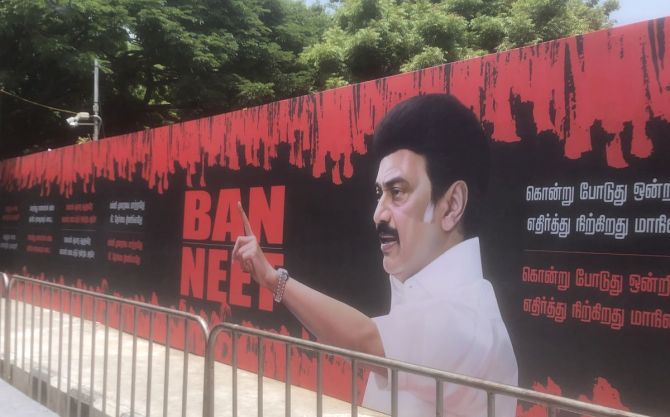
The future of a staggering 24 lakh students hangs in the balance on account of the complete failure of the Narendra Modi government’s Education Ministry and NTA, the body that regulates NEET. Their functioning has been marked by egregious violations, unprecedented paper leaks and corrupt practices, compelling authorities to cancel the examination. The MK Stalin led Dravida Munnetra Kazhakam (DMK) government in Tamil Nadu has been opposing this controversial entrance examination since its introduction. It had even challenged NEET’s constitutional validity in the Supreme Court of India (SC), and the petition is still pending!
To inquire into structural inadequacies, a high level committee had been appointed by the TN government to assess NEET’s impact. The report of this Committee is revealing. This article delves deep into the Justice AK Rajan Report of 2021 that was recently brought back into the public domain by Tamil Nadu Chief Minister (CM), MK Stalin.
Before that the murky background of the NEET Examination.
The result of the National Eligibility cum Entrance Test 2024 (NEET-2024), an exam conducted by the National Testing Agency (NTA), on June 4 resulted in an uproar across the length and breadth of India. NEET is the national-level uniform test for admissions to undergraduate and postgraduate medical courses across the country. NEET-UG examination for this academic year was held by NTA on May 5, and more than 24 lakh people had appeared for it. This “competitive test” is held for those seeking admission to medical, dentistry, and AYUSH programs in government and private universities throughout India, for a little above 1 lakh MBBS seats in 700 plus medical institutions.
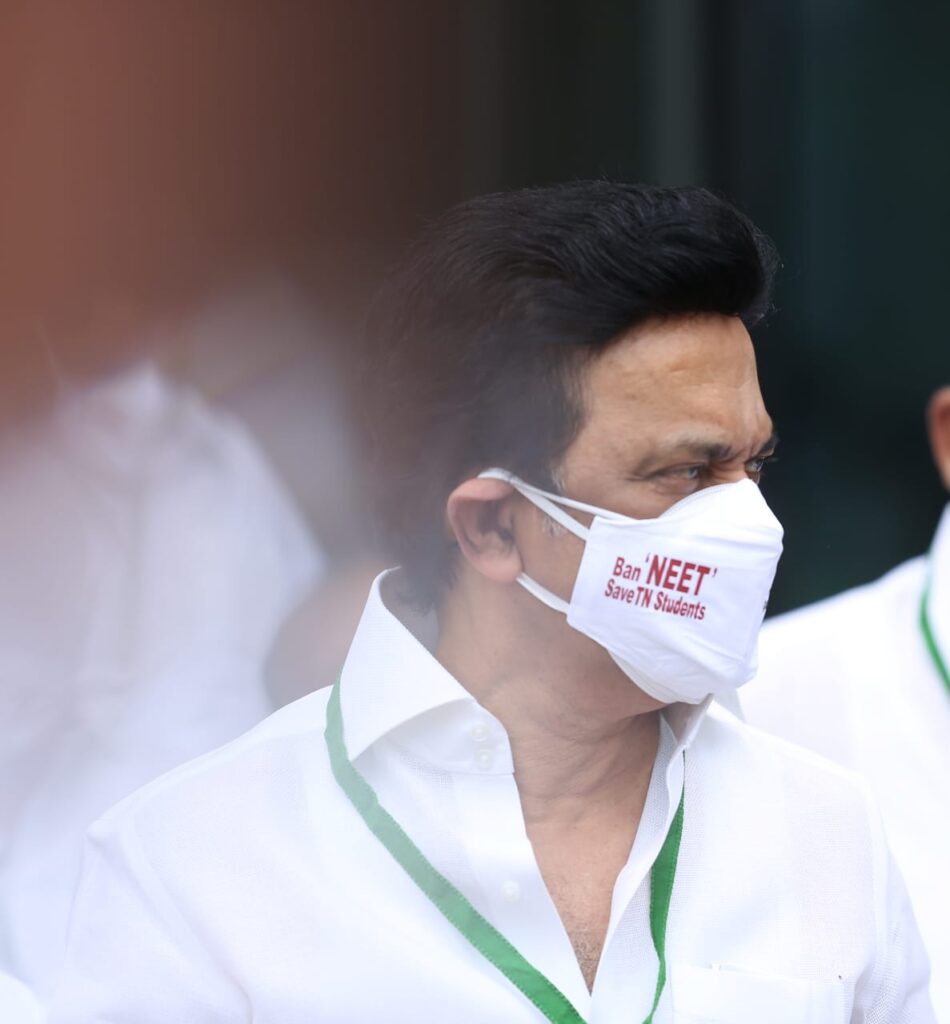
Since the results made public last week, news of there being corrupt malpractices with respect to the conduct of the exam, paper leaks and arbitrary grant of grace marks while processing of results have emerged. Students, citizenry and leaders of opposition parties have been protesting to raise concerns about the exam regarding the alleged malpractices. It is essential to note that the issue of grace marks was that the said grace marks were awarded arbitrarily by the NTA to some 1,500 candidates for “loss of time”, while at least 44 of the toppers getting grace marks for getting an answer wrong only because a version of a Class 12 NCERT textbook had an inaccuracy. (Details can be read here, here, here and here).
Amidst the said chaos and the uproar, Tamil Nadu Chief Minister M.K. Stalin shared the report of Justice A.K. Rajan Committee, a High-Level Committee headed by the retired judge of Madras High Court in 2021, which had recommended for the scraping of the NEET exam. In a post on X (previously Twitter), Stalin stated: “After assuming power [in 2021], we formed a High-Level Committee led by Justice A K Rajan to investigate the impact of the NEET- based admission procedure. The Committee’s report, which is based on comprehensive data analysis and input from students, parents, and the general public, has been published and sent to various state governments to highlight NEET’s anti-poor and anti-social justice tendencies.”
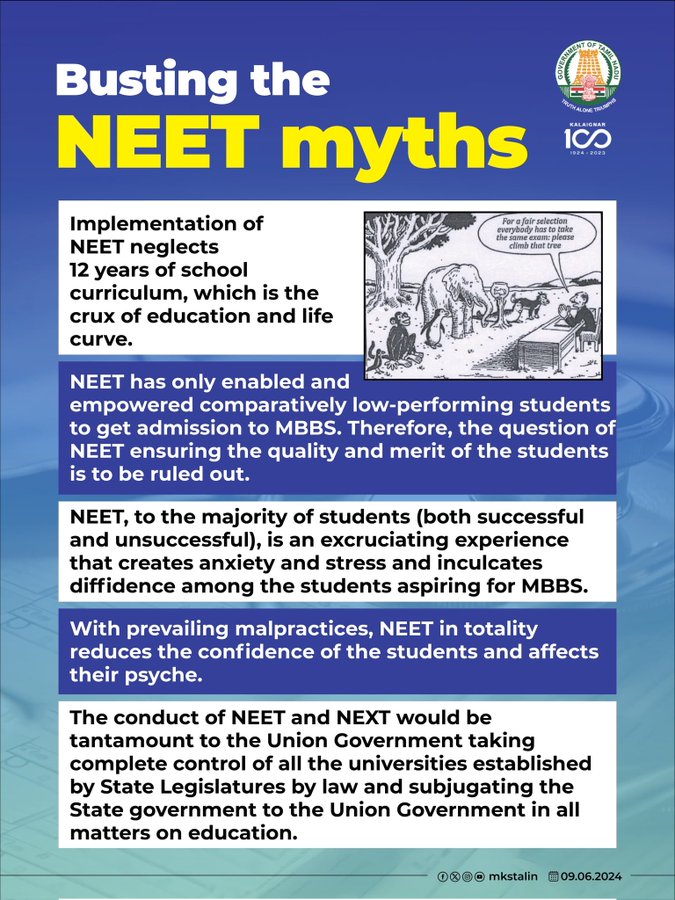
The post can be viewed here.
It is pertinent to note that ever since NEET was made compulsory in 2017, the state of Tamil Nadu had opposed it. The state has maintained that NEET, which is conducted by the Union government’s Central Board of Secondary Education, goes against the interest of state board students. As per the post of CM Stalin, the said report committee is being put out by him in nine languages with the hope that this will help people understand the ills of NEET and why the same has been rejected by the state of Tamil Nadu.
Immediately after NEET’s imposition across the length and breadth of the country—never mind the fact that ‘Education’ as a subject remains in the Concurrent List of the Constitution where States have an equal stake and say — in February of 2023, the Tamil Nadu government had moved the Supreme Court challenging the constitutional validity of NEET. The TN challenge emphasised the fact that the single-window examination for admissions to medical colleges across the country violates the principle of federalism, which is part of the basic structure of Constitution. The main argument raised by the state was that NEET takes away the autonomy of states to make decisions regarding education. The petition remains pending.
Justice AK Rajan Committee Report
Members of the AK Rajan Committee: Dr. G. R. Ravindranath (General Secretary, Doctor’s Association Social Equalities), Professor L. Jawahar Nesan (Former Vice-Chancellor), Dr. J. Radhakrishnan (Principal Secretary to Government, Health and Family Welfare Department), Tmt. Kakala Usha (Principal Secretary, School Educatio), Thiru. C. Gopi Ravikumar (Secretary Law), Dr. P. Senthil Kumar (Principal Secretary/OSD, Health and Family Welfare), Dr. R. Narayana Babu (Director of Medical Education), Dr. P. Vasanthamani (Additional Director of Medical Education/Secretary, Selection Committee).
The 165-paged Rajan Committee report has found that after NEET was introduced in 2017-18, fewer students from rural areas, those studying in the Tamil medium, those from families with lower incomes, and those from Tamil Nadu state board schools, secured admission in medical colleges in the state. In the years since its implementation – after interviews with parents and students who applied and who emerge successful – the Committee found that the trends of applications and admissions in medical admission in Tamil Nadu started indicates that the NEET has caused an unprecedented havoc and setbacks for the students of varying social, economic and demographic denominations aspiring for medical studies. The same eventually prompted the Tamil Nadu Government to establish this committee in the state in 2021 to study the impact of the NEET on the admission prospects of students belonging to the state.
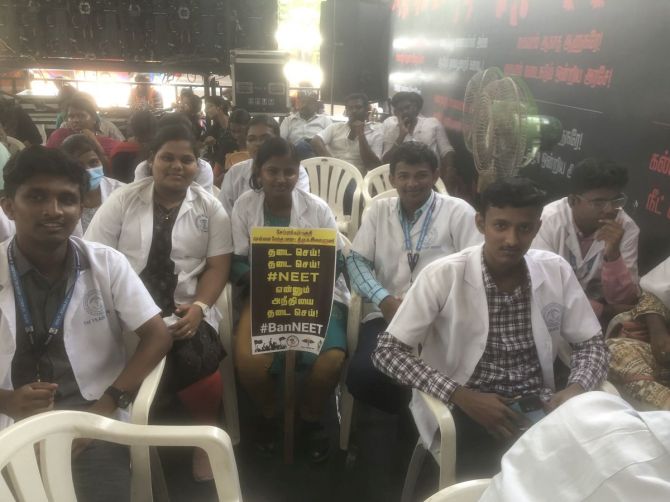
It is essential to note that based on the findings and suggestions of this report, in 2021 itself, the Tamil Nadu Assembly unanimously passed a Bill to ban NEET, only for governor RN Ravi to withhold consent for months before returning the Bill to the Assembly for reconsideration. In February 2022, the Assembly had readopted the Bill without any amendments. The Bill was forwarded by the Governor to President Draupadi Murmu in May of 2024 after Governor Ravi had refused to give his assent, despite it being constitutionally mandated that he gives his assent if a Bill is returned to him a second time without amendments and then pass it on to the President to sign. Notably, the Bill is still pending with the President. Following the example of Tamil Nadu, the state of Karnataka is also mulling over bringing in a similar law and scrapping NEET in the state in view of the recent malpractice allegations.
Contents of the report
The 165 pages report has been divided into a total of nine chapters, which dissects and looks at the issue of NEET from the perspective of academic, socio-economic and other demographic status and health services in Tamil Nadu as well as the constitutional provisions related to education in India. Additionally, the report further deals with the flaws that exist with the concept of conduction Common Entrance Examinations. Regarding NEET, the report explores the history of NEET, the academic merits and validity associated with it and the opinions of the stakeholders.
Based on this analysis, the report then puts out certain recommendations for the Tamil Nadu government, advising them that the state government must undertake immediate steps to eliminate NEET as a qualifying criterion for admission to medical programs by following the necessary legal and legislative procedures. As per the committee, the same can be done by the state government by asserting that the term ‘University education’ in Entry 25 List III is a general provision, while ‘Regulation of Universities’ in Entry II is a special provision, and Entry 32, an exclusive state subject, cannot be ignored.
It is crucial to highlight here that the committee’s report is based on extensive data analysis as well as over 86,000 inputs received by the Committee from students, parents and the public. In the said report, the committee has shed light on the negatives of the NEET exam model by observing that it promotes “coaching” rather than “learning” relying on data to drive home the point that those who undergo coaching or repeat the exam are at an advantageous position in clearing it. In addition to this, the report also provided data supporting the contention that those social groups who were the students of Tamil medium, rural background, government schools, and parental income less than Rs. 2.5 lakh and socially depressed and disadvantaged groups like MBC, SC, and ST were highly affected by the introduction of NEET.
The report also refers to the drastic decrease in the number of Tamil-medium students getting selected for MBBS after NEET was introduced.
As per the data released by the committee, it is shown that the number of Tamil-medium students getting into government and private medical colleges has taken a huge hit after NEET came into being in the state in 2017. As provided in the report, 456 students from the Tamil medium got into MBBS in 2010-2011 when the admission was based on marks scored in plus-two exams.
Even in the year 2016, the number of Tamil-medium students who had secured admission to medical colleges 2016, a year before NEET, was 537. However, it witnessed a steep fall in 2017 when just 56 students from the Tamil-medium secured admission. Since 2017, the number of Tamil-medium students being selected to medical colleges remained low only, with only 119 Tamil-medium students got into medical colleges in 2018, followed by 71 in 2019. The report also provides that the number of Tamil-medium students securing a seat in 2020 rose only because a 7.5 per cent quota for government school students who clear NEET in medical admissions by the then AIADMK government.
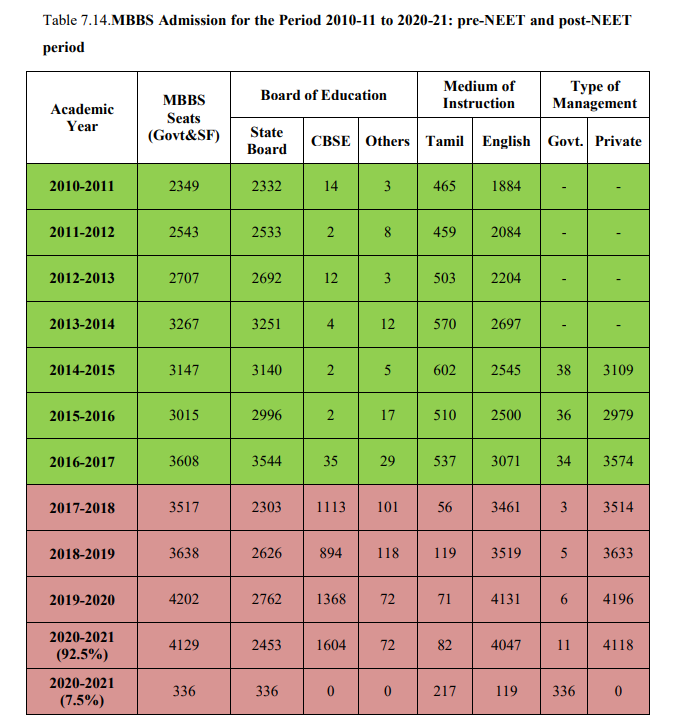
A percentage wise comparison of the number of students from Tamil-medium who got into medical colleges has also been provided in the report, which showed the percentage coming down to 1.6 per cent in 2017 from 19.79 per cent in 2010. This downward trend was in contrast with the number of students from English-medium who secured admission in medical colleges, which went up to 98.41 per cent in 2017 from 80.2 per cent in 2010.
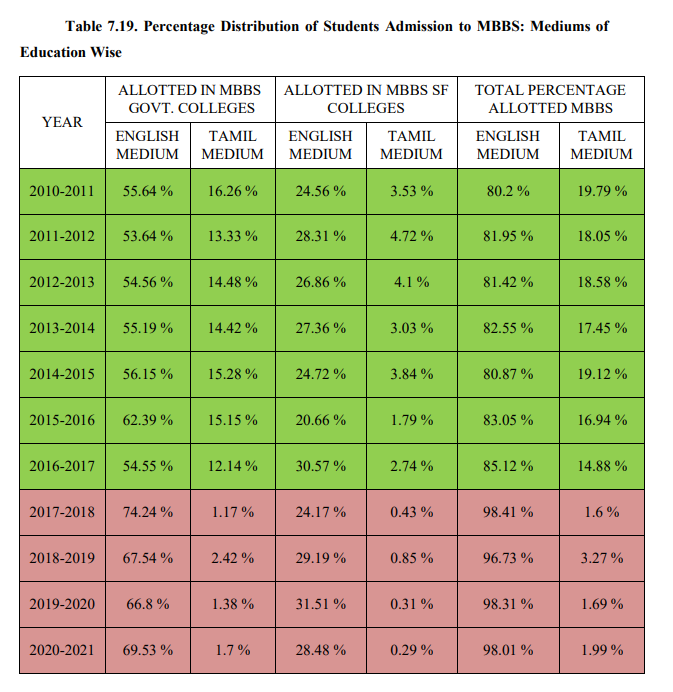
On the issue of impact of annual family income to those who were able to get admission in allotted colleges or self-financed colleges, the report showed that the students‟ Parental Income < 2.5 Lakhs diminished reasonably as opposed to those belonging to the group of > 2.5 Lakhs whose share has increased after the NEET. As per the data provided in the tables, it can be clearly seen that there existed a trend favouring the group of more than 2.5 Lakhs compared to the ones whose family income was less than 2.5 lakhs. Notably, even though there was a similar trend before and after the NEET, but the gap between their shares has widened in the post-NEET compared to the pre-NEET.
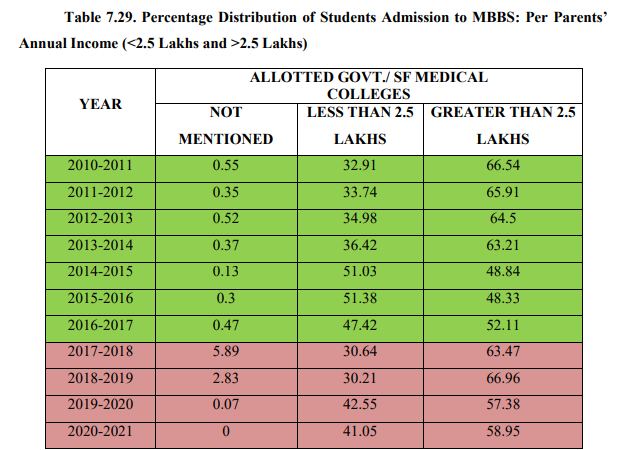
The report also provided the admission data of the students in terms of their geographical location. The table of the data showed the percentage distribution of the students, from rural and urban setup, who have secured admissions in both the Government and Self-Financing colleges. From the data provide, the panel found a 12 per cent (from 61.45 per cent to 49.91 per cent) drop in the share of rural students from pre-NEET to post-NEET. On the other hand, the urban share rose from the pre-NEET average of 46.33% to 52.86% in 2020-21 in the post-NEET period. It indicates, in both categories, compared to the pre-NEET period, the rural segment has lost its share of admission in the post-NEET that it once maximally enjoyed in the pre-NEET.
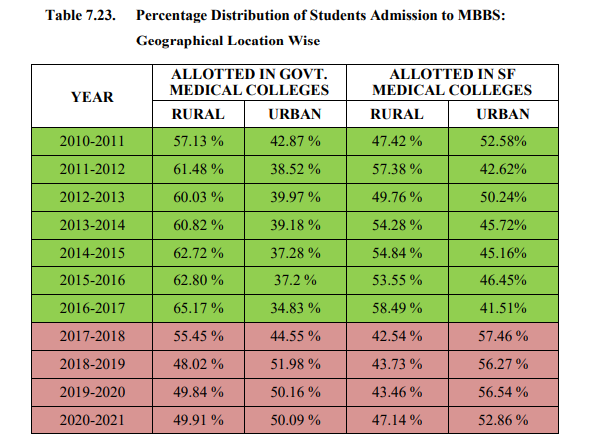
The report also dissects the data of the students in terms of their becoming First Generation Graduate (FGG) or being from Non-First Generation Graduate (Non-FGG) family. As per the data provided in the report, based on the rate of applications, the FGG’s application was reduced in the post-NEET as opposed to increased rate of applications by the Non-FGG. The data shows that in both Government and Self-Financed Colleges, the Non-FGG students secured admissions far greater than the FGG students in the post-NEET compared to the pre-NEET period. Also, within the same medium categories, the trend shows a drastic change in admissions between the pre-NEET and post-NEET periods. For instance, as is evident from the data, the overall percentage share of the FGG has reduced from 24.94% in 2016-17 to 14.46% in 2020-21 in the Government lot, while that of the Non-FGG rose to 85.54% in 2020-21 from 75.06% in 2016-17.
The data of the report indicates that in both government allotted as well as self-financed college categories, compared to the pre-NEET period, the FGG segment was the worst affected segment which lost almost 45% of its share that it enjoyed in pre-NEET to the non-FGG group in the post-NEET.
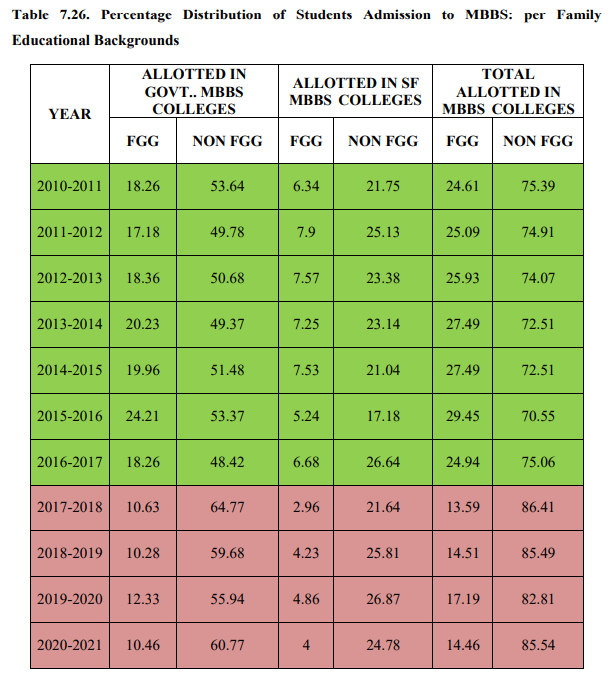
On the concern of mushrooming of coaching centres that charge exorbitant fees, the report provides that competitive exams revolve around the coaching class ecosystem, which, thus have grown around JEE and NEET in India. In reference to Tamil Nadu, the report states that branches of every key coaching institute opening shop in major cities and affluent rural areas was the result of the compulsory implementation of NEET in 2016. Providing the data on the percentage of students that took training prior to attempting the NEET exam, the report highlighted that of the students who secured admission in the year 2019-20, 99% students had received prior training before the NEET.
Connecting the issue of geographical location and income of the family with accessibility to coaching, the report highlights that rural students studying in Government Schools coming from economically weaker section find it difficult in joining the Coaching centres in the city where the fees are high and the boarding facilities are also not affordable to stay in the City to attend the coaching classes for NEET examination. Especially, poor students from rural backgrounds and those who have studied in the vernacular medium face great disadvantage, because of the trespassing coachers encroaching education. Comparatively students studying in State Board/CBSE/ICSE syllabus in the city have easy access to join coaching centres in the city where transportation facilities are available compared to the rural areas.
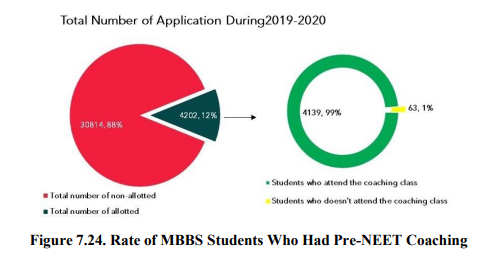
Gist of the findings of the report:
Following findings can be deduced from the report:
- While English-medium students had more seats even before NEET, their share increased after NEET, while Tamil-medium students’ proportion decreased.
- Between 2010-11 and 2016-17, students from rural regions received 61.5% of available places in government medical institutions. Post the introduction of NEET, the percentage of students from the rural back securing admission in medical dropped. In contrast, the proportion of students from metropolitan regions in government medical institutions increased from an average of 38.55% in the pre-NEET years to 50.09% in 2020-21.
- The report stated that NEET has been successful mainly for the repeaters (71 per cent in 2021) and those students who have gone through coaching while opining that Tamil Nadu’s robust health care system will go back to “pre-independence era“ if NEET continues as the pattern of selection in MBBS admission.
- According to the Rajan Committee, the proportion of students from higher-income households grew after NEET, while that of students from lower-income families fell. Students with parents earning less than Rs 2.5 lakh per year received an average of 41% of admissions prior to NEET, however this ratio dropped to 36% in the post-NEET years. For pupils whose parents earned more than Rs 2.5 lakh per year, these figures were 58% and 62% on average in the pre-NEET and post-NEET eras, respectively.
- According to the Committee, CBSE students gained an advantage over Tamil Nadu state board students following the NEET. The percentage of candidates from state board schools decreased from nearly 95% on average in the pre-NEET years to 64.27% in 2020-21, while applications from CBSE schools surged from an average of 3.17% pre-NEET to 32.26% in 2020-21.
- The study said that “the argument that the NEET mark, as opposed to HSC (higher secondary certificate of the state board) mark tests the standard of the student and signifies merit is a baseless argument”. It was noticed that prior to NEET, the average HSC score of students admitted to MBBS courses was 98.16%, compared to 89.05% after NEET. The committee has also specified in the report that while a comparison between the HSc and the NEET scores is like comparing orange with apple, however, the Committee has to do so in response to the arguments of the critics of HSc who argue that NEET is the best assessor of students‟ standard and abilities, because of its assessment and syllabus superiority.
- Regarding the influence of coaching institutes on admissions, the research said that 99% of students who obtained admissions in 2019-20 had training prior to NEET. The report also revealed that NEET coaching centres had become a Rs 5,750 crore industry in the state.
As provided in the report, Ranjan committee observes that “The aftermath effect of the NEET has already embarked with signs of changing profile of the Doctors between the pre-NEET and post-NEET period, creating a generation of doctors and teaching faculties from mainly the privileged communities- the affluent, the creamy, the urban genre who are well away from the grass root realities of the diverse social structure – the implication of which will be palpable in the society in years to come if not intervened at the 111 earliest. While the reasons and interventions may be multi-dimensional including academic reforms and bottom- up socio economic uplift, if the pre and post NEET scenario is considered, the aftermath effect has aggravated the divide and worsened the medical and healthcare sector in all its tributaries; like medical education, medical profession, and public healthcare system and service.”
Recommendations and conclusion of the report:
The report in its entirety highlights the need to do away with NEET. The recommendations are grounded in substantial data and aim to ensure justice, protect vulnerable communities and foster a more holistic and fairer educational environment.
- Elimination of NEET
NEET has been criticized for creating an uneven playing field. The first and foremost recommendation is that state government should take immediate steps to eliminate NEET from being used in admissions to medical programs at all levels.
The state can do this in two ways.
First, the state government can argue that “University education” under Entry 25 List III is seen as a general provision, while “Regulation of Universities” under Entry 32 is viewed as a special provision. Entry 32 is an exclusive state subject, which means that Article 254, which deals with conflicts between state and central laws, cannot override Act 3/2007 in relation to Entry 32. Consequently, admissions to colleges affiliated with the Tamil Nadu Dr. M.G.R. Medical University should be governed by Act 3 of 2007, excluding the application of Section 14 of the NMC Act.
Second, the committee suggests that the State Government may pass a new Act, similar to Act 3/2007, to eliminate NEET at all levels of medical education. This Act, then must receive the President’s assent to ensure its validity.
- Sole Admission Criteria Based on HSc Scores
The committee proposes that Higher Secondary (HSc) scores should become the sole criteria for admission to first-degree medical programs. To ensure fairness among students from different educational boards, normalization of scores should be implemented.
- Addressing Socio-Economic Adversities
The committee calls for the identification of socio-economic and other demographic adversities that contribute to poor performance among disadvantaged students in their HSc examinations. Based on the degree of these adversities, a framework of “Adversity Score” should be developed to re-profile students’ scores.
- Reforming School Education
The committee emphasizes the need to reform school education up to the HSc level. The focus should be on fostering learning rather than coaching. The entire educational process, from curriculum development to teaching methods and assessment, should be oriented towards equipping students with subject knowledge and higher-order skills such as reasoning, decision-making, and social disposition.
- Bringing Deemed Universities Under State Purview
The final recommendation suggested by the committee is that an Act should be passed by the Tamil Nadu assembly to bring all deemed universities in the state under its jurisdiction, similar to Act 3/2007. This Act must also receive the President’s assent.
In conclusion
Justice Thiru A. K. Rajan through this report presents a critical re-evaluation of the current NEET-based medical admission process in India. The report concludes with stating that persisting with NEET will jeopardize the state’s healthcare system by potentially creating a doctor shortage in crucial Primary Health Centres and will jeopardize the availability of specialists in government hospitals. Furthermore, it is stated that NEET disproportionately disadvantages students from underprivileged backgrounds, both rural and urban, hindering their aspirations to become doctors. This trend, if left unchecked, risks a regression to a pre-independence healthcare scenario reliant on minimally trained personnel. Such a decline would significantly erode Tamil Nadu’s standing as a state with an advanced medical and healthcare system.
To avert this detrimental trajectory, the report suggests the state government to act swiftly to abolish NEET as a medical admission requirement. Implementing the recommendations outlined in the report, encompassing legislative actions and targeted educational reforms, will pave the way for a more equitable and effective system to nurture future medical professionals. These necessary steps not only safeguard the state’s healthcare infrastructure but also promote social justice by offering equal access to medical education for all students, irrespective of their socioeconomic background.
The complete report can be viewed here.
This article was published on Sabrang India and can be read here.



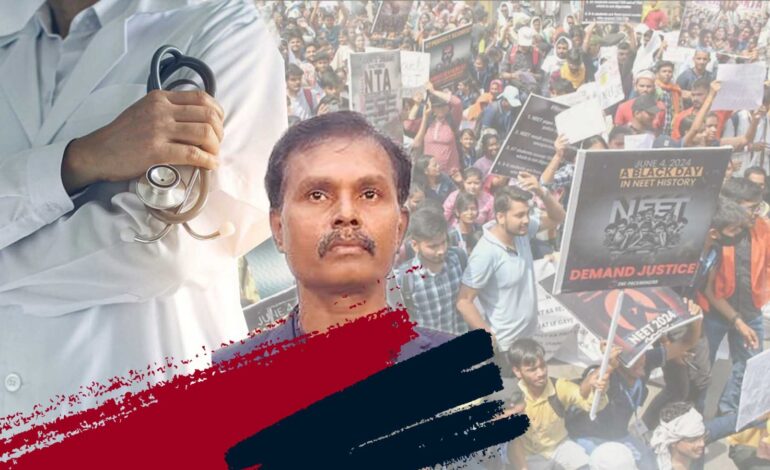

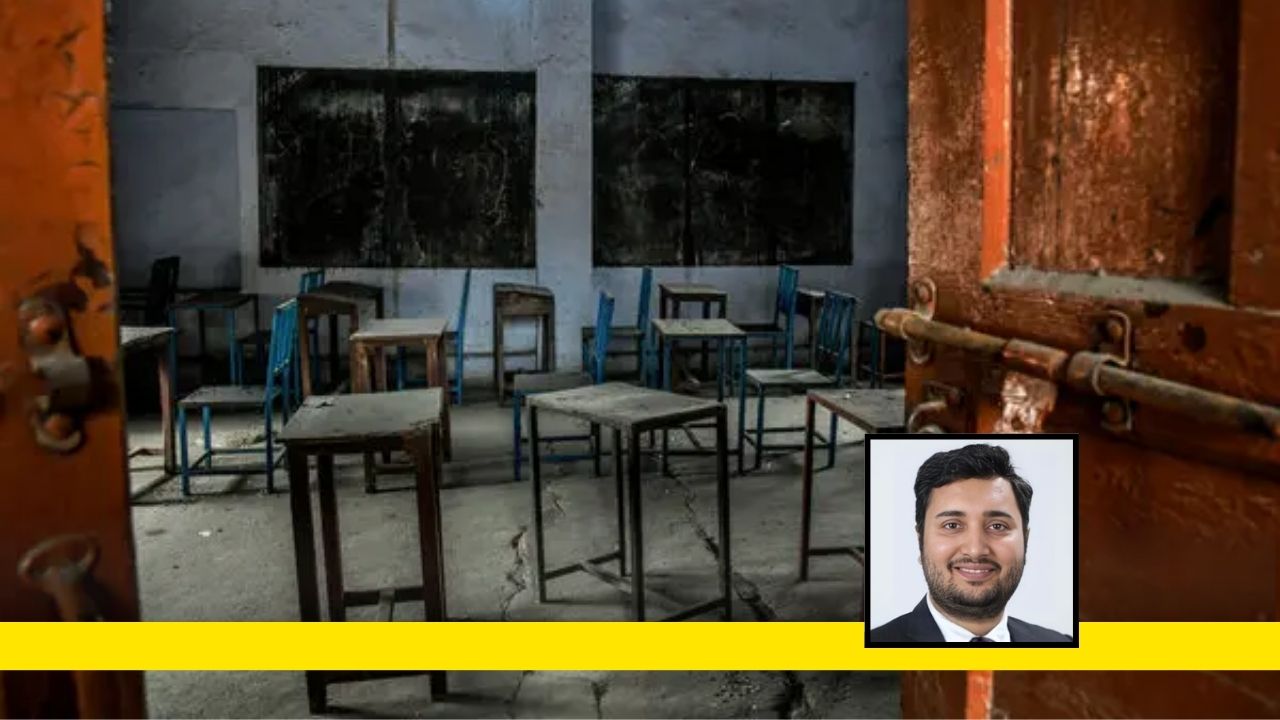
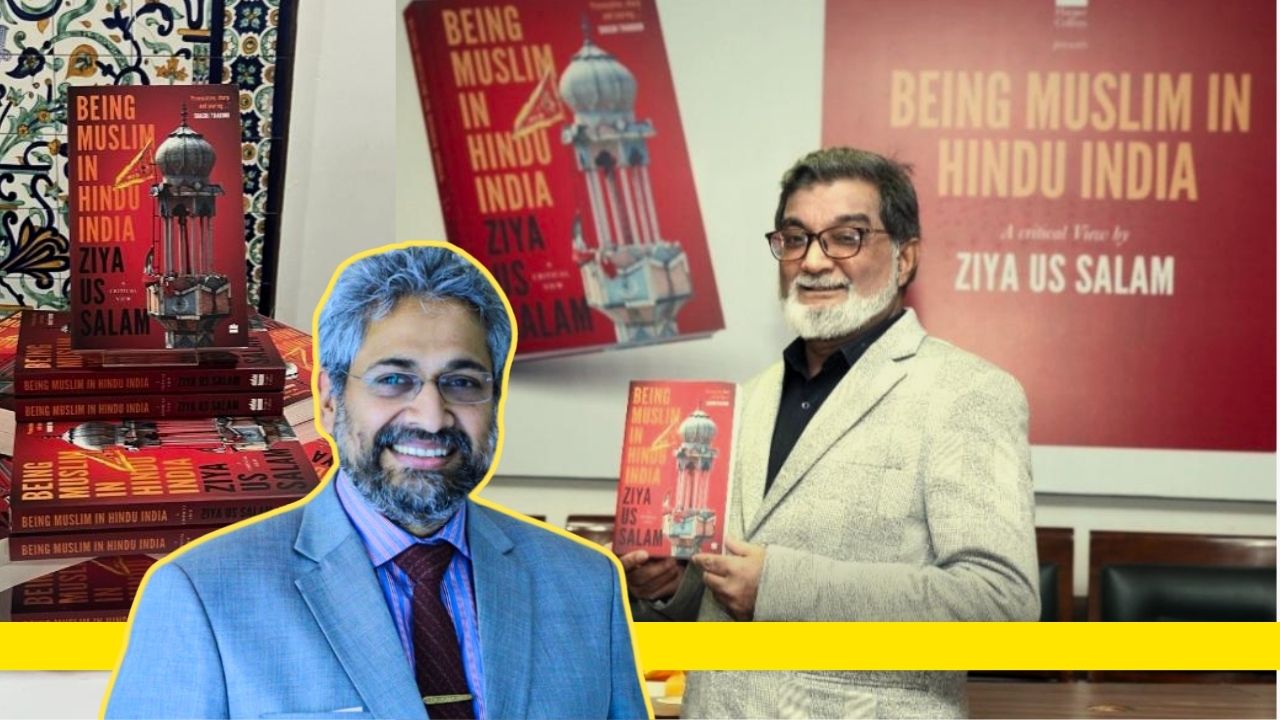



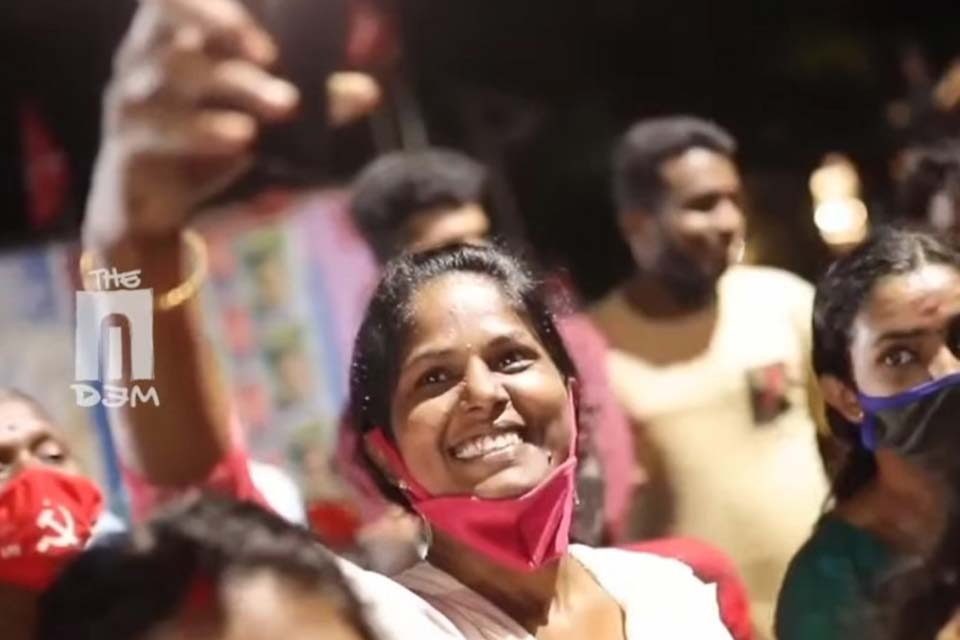

Good article